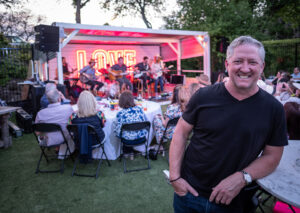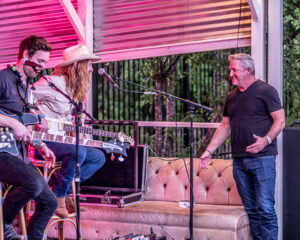
Chewing over Fort Worth’s music scene with Tim Love and Jamey Ice
By Scott Nishimura
Photography by Olaf Growald
The steaks have been hoovered and we’re to the coffee course at Tim Love’s Tannahill’s Tavern & Music Hall in the Fort Worth Stockyards and the nut of what he and musician Jamey Ice have to say about the state of Fort Worth’s music industry.
Love has ordered a double espresso. It’s 7:30 p.m.; Ice and I politely decline. The topic over dinner: With the recent closures of some venues in the city, Love and Ice have heard the hand-wringing about the condition of Fort Worth’s music scene. They wave those concerns off.
“I’m sorry that we have bad business people,” Love says, in his usual bluntness. “It’s the truth. The music is great in Fort Worth. The scene is great in Fort Worth.”

Tim Love, at his Gemelle restaurant in Fort Worth, wants to book more music events paired with food at his bars and restaurants.
In any case, Love and Ice — longtime collaborators — have teamed again to boost Fort Worth music, holding a pair of concerts in April they believe can help forge a model for the city. Ice and his Green River Ordinance band played a private concert at Love’s Gemelle restaurant in west Fort Worth, and the next night, the band played a public gig at Tannahill’s, where Love curated a food option for the “elevated” ticketholders. He wants to put on more like collaborations.
“I don’t know if it could have been any more successful; it was crazy,” said Love, who books musical acts in his eight Fort Worth restaurants and bars and also co-owns the Fort Worth Music Festival.
“What establishes us as a music city is things like that, right?” Love says of his partnership with Ice, whose band established itself years ago, before Ice added ventures in real estate, hospitality and marketing. “While the music is at the forefront, support of all that is what keeps the bands coming back. Now, our passion here is we treat the bands better than the fans, and then the bands take care of the fans. Jamey and his crew are very good at that. And so, why not start off with a hometown guy?”
Of course, both believe more can be done to help the music scene surge. The lack of a mid-sized venue in Fort Worth, and music industry perceptions that the Dallas-Fort Worth region is one market that can be covered by, say, one show in Dallas or at the Toyota Music Factory in Irving are top of mind.
360West: So, what assets do we have? What pieces are missing?
Love: We’re missing a 4,000 [capacity] amphitheater. A 4,000-cap amphitheater, which is what [the shuttered] LaGrave Field [on Fort Worth’s Northside] should be.
Ice: Fort Worth’s never had a bigger size venue. There always was a huge gap between a 300-capacity venue and Billy Bob’s, which is 5,000 capacity. And so, most of [Green River Ordinance’s] career was always in the 700 people to 2,000 people range, which meant we would either have to do multiple nights in Fort Worth, or we’d have to go to House of Blues in Dallas.
360West: What kinds of shows do we miss by not having that capacity?
Love: These really eclectic, great bands, you know? NEEDTOBREATHE, 311.
Ice: You look at everything that’s going to Irving, the Toyota Pavilion?
360West: Toyota Music Factory?
Ice: That’s where everyone’s going.
Love: And then, we’re missing the promotion from our own city, and I love our city that says, ‘We’re Fort Worth.’ Pearl Jam played here, [at Dickies Arena in Fort Worth], right? Not Dallas. But you know what happened? Their agent said, “We’re playing Dallas and Fort Worth.” You follow what I’m saying? Here’s the deal, two zoos, two downtowns, two universities, it’s two different cities.
Ice: Dickies [Arena] has proven that we’re two different markets.
Love: But the agents and the managers do not understand that. It’s a genuine ignorance, like the definition of the word ignorance; 90% of the agents have never set foot in Fort Worth. It’s just Dallas. If I play Tannahill’s in Fort Worth, I’ve already played Dallas, so I can’t play Dallas. But what should happen is you play Dallas, you should play Echo Lounge, and come to Tannahill’s in Fort Worth.

Tim Love (standing) and Jamey Ice (sitting at right), during a private concert in April at Love’s Gemelle restaurant.
Ice: That’s what we did the last time.
Love: And what happened? Sold them both out. So, the vision of city and market has got to happen in order for us to really drive the music program here. The icing on the cake is, you can play Fort Worth and literally drive to Dallas and play another show, and get two shows, and stay at the same hotel, and make more money. And if we put a bigger band here, I’ll make it up, Stone Temple Pilots, I think you can double the ticket price. Fort Worth is a slightly smaller community, but we’re a cash-rich community, as it is, per capita. And people that want to see Stone Temple Pilots, the people my age, they’ll pay 150 bucks, instead of $65, to be in a thousand cap room.
360West: So when you say the Fort Worth music scene is great, what characterizes it as great?
Love: Well, I think you’ve got a lot of people who want to play music. And you’ve got to assume that there’s some genuine gems in there. And then, there’s some that maybe are good, and some that aren’t so good. But I think there’s a lot of room there, because we’re the 12th largest city in the country. We’ve got a lot of talent here. Our goal is to find it. Playing a lounge or a Saturday afternoon show. My goal is to be the guy that finds the next Maren Morris. I mean, she started at [Love’s] White Elephant. I think we’re going to find it, whether it be at Fort Worth Music Festival, or just all of a sudden, somebody just shows up at White Elephant, like, “What the heck?”
360West: Tell us about this year’s Fort Worth Music Festival [its second]. How did it go?
Love: Double the attendance of last year. This year, we’re at 6,800. Our goal was 5,000, and we’re confident in 10,000 next year. Our layout was awesome. We moved people around really well. I mean, South by Southwest jumped the shark. Its not about music. I want Fort Worth Music Festival to be about music. I want guys and girls sitting on the sidewalk, playing guitars, and I want agents and managers walking up and down the street, going, ‘What’s your name? What’s your name? Where are you from?’
Ice: That’s how we originally got signed. It was like early South by …
Love: See what I’m saying? Exactly.
Ice: We were playing this rowdy club, and it was sold out, and people couldn’t get in. And then, these people who were walking by, and they’re like, ’who is this?’ But it was less about these industry parties.
Love: That’s what real music is about. People play it, and other people watch it. And then, if it’s good, if the music’s good, people stay. It’s not a hard formula.
